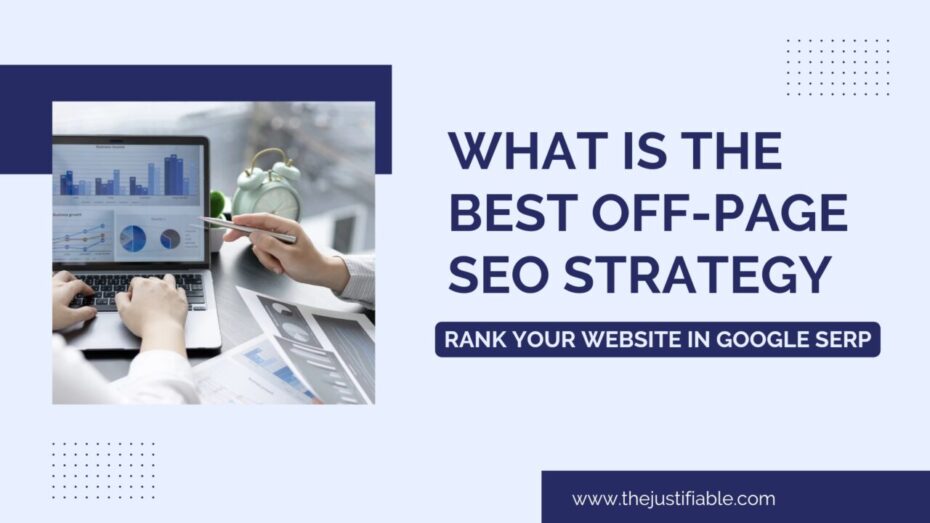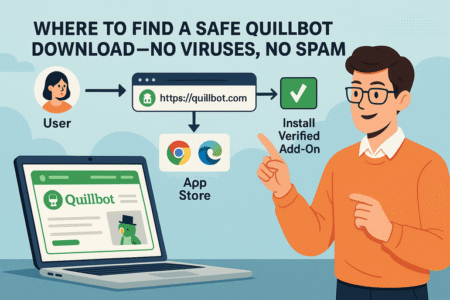Table of Contents
Are you struggling to rank your website higher on Google? Wondering which off-page SEO strategies can give you that competitive edge?
In this article, you’ll discover the most effective off-page SEO techniques to enhance your website’s visibility and dominate the Google SERP.
Mastering Link Building for Off-Page SEO Success
Link building is an essential component of off-page SEO, acting as a powerful catalyst to enhance your website’s authority and search engine rankings. When done right, link building can significantly elevate your site’s position on Google, making it more visible to potential visitors.
However, mastering link building requires more than just acquiring links; it demands a strategic approach to ensure the links you obtain are of the highest quality.
Understanding the nuances of link building can transform your SEO efforts. High-quality backlinks, earned through reputable sources, signal to search engines that your site is a credible and valuable resource.
But it’s not just about quantity—it’s about the quality and relevance of the links that point to your site. In the following sections, we’ll explore the impact of quality backlinks, strategies to earn them, and the dangers of toxic backlinks.
SEO Services Recommendations
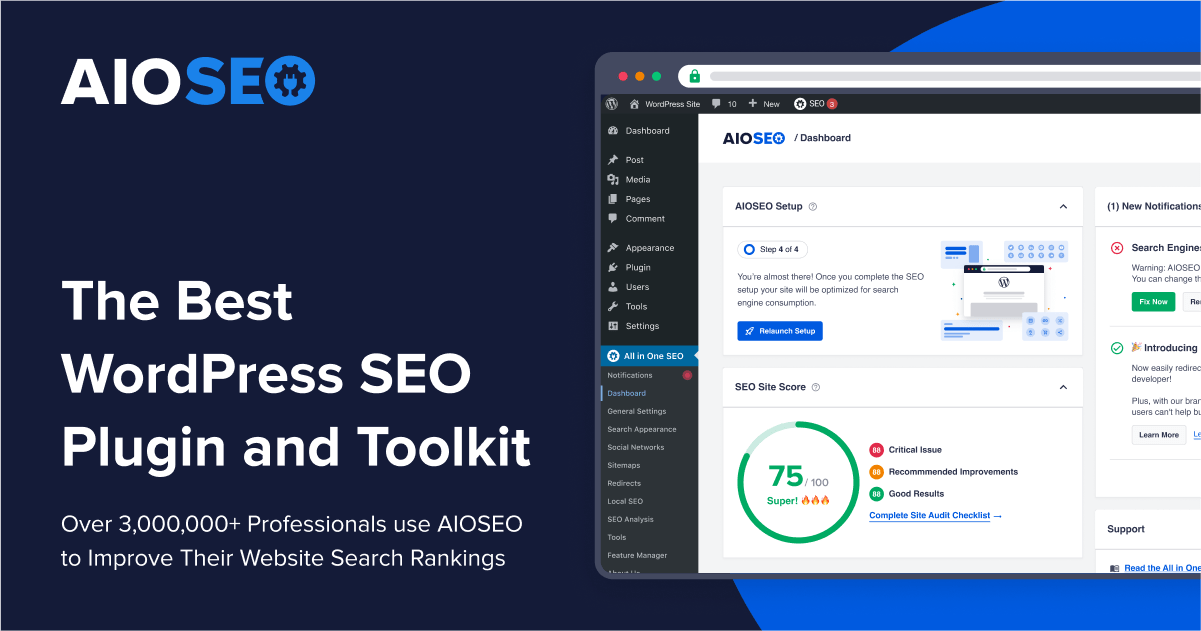 AIOSEO
| 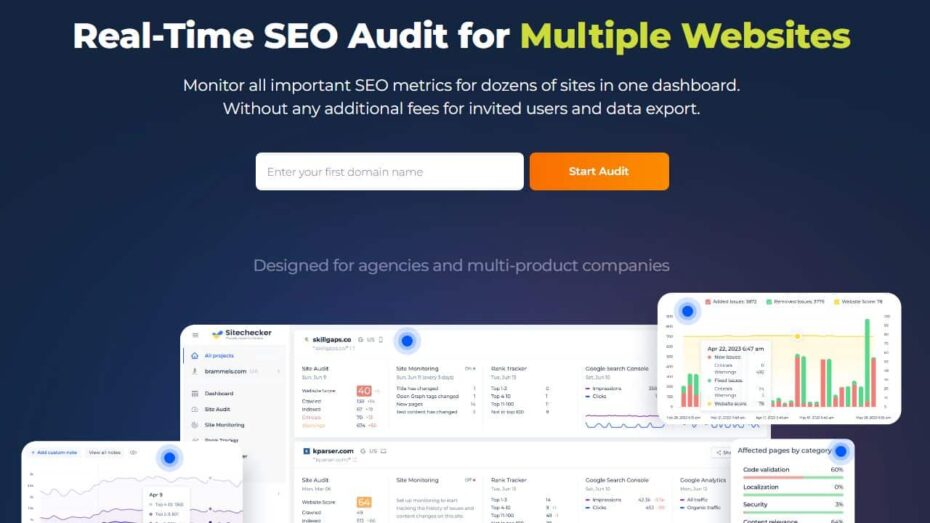 Sitechecker
| 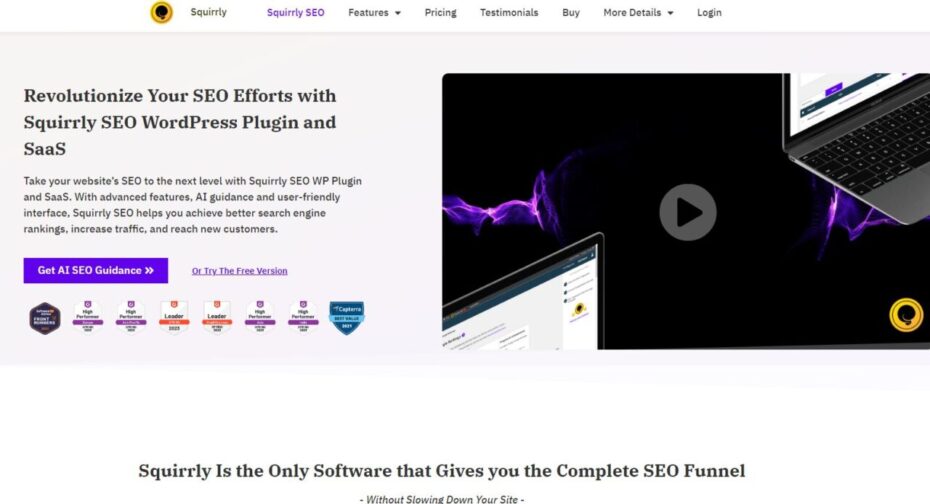 Squirrly
|
How Quality Backlinks Boost Your SEO
Quality backlinks are like votes of confidence from other websites, signaling to search engines that your content is trustworthy and valuable. When authoritative sites link to your pages, it tells Google that your content is worth ranking higher.
This, in turn, can lead to increased visibility, more traffic, and better overall SEO performance.
One of the key factors that make a backlink valuable is the authority of the linking site. Links from well-established, high-authority websites carry more weight than those from lesser-known sites.
Additionally, backlinks from sites within your niche or industry are even more potent because they reinforce the relevance of your content.
Another important aspect of quality backlinks is the anchor text used in the link. Anchor text that is relevant to your content and includes your target keywords can further enhance your SEO.
However, it’s crucial to maintain a natural balance and avoid over-optimizing anchor text, as this can lead to penalties from search engines.
Finally, quality backlinks contribute to building your website’s overall domain authority. As your domain authority grows, your site becomes more competitive in search rankings, allowing you to target more competitive keywords and attract even more organic traffic.
Proven Strategies to Earn High-Authority Links
Earning high-authority links is an art that requires a mix of creativity, persistence, and strategic outreach. One of the most effective ways to attract these links is through content creation. Producing high-quality, informative, and engaging content naturally attracts links from other sites looking to reference valuable information.
Another proven strategy is guest posting on reputable sites within your industry. When you contribute high-quality content to other websites, you not only gain exposure to their audience but also earn valuable backlinks in return.
The key is to target sites with a strong domain authority and a readership that aligns with your target audience.
Building relationships with influencers and bloggers in your niche can also lead to valuable backlinks. By networking and offering to collaborate on content, you can earn links from their blogs or social media profiles.
These influencers often have high-authority sites that can significantly boost your SEO.
Lastly, utilizing broken link building can be an effective technique. This involves finding broken links on high-authority sites and offering your content as a replacement.
This not only helps the site owner fix a problem but also earns you a quality backlink in the process.
Avoiding Toxic Backlinks and Their Impact on Rankings
While high-quality backlinks can boost your SEO, toxic backlinks can have the opposite effect. Toxic backlinks come from spammy, irrelevant, or low-authority sites and can lead to penalties from search engines. These penalties can cause your rankings to plummet, undoing all your hard-earned SEO efforts.
One way to identify toxic backlinks is through regular backlink audits. Using tools like Google Search Console or third-party SEO software, you can monitor your backlink profile and spot any potentially harmful links.
If you find any, it’s crucial to take action immediately, either by reaching out to the site owner to request link removal or using Google’s Disavow Tool to disassociate your site from those links.
Another way to avoid toxic backlinks is to be cautious about the sites you engage with. Avoid participating in link schemes, which involve exchanging links with other sites solely for the purpose of boosting rankings. These practices are against Google’s guidelines and can lead to severe penalties.
Finally, always focus on building links organically. Avoid shortcuts that promise quick results but may lead to toxic backlinks. Instead, invest in long-term strategies that prioritize quality and relevance. This approach not only protects your site from penalties but also ensures sustainable SEO growth over time.
Leveraging Social Media for Off-Page SEO
Social media has become a powerful tool in off-page SEO, offering opportunities to enhance your website’s visibility and authority. Integrating social media into your off-page SEO strategy not only boosts your brand’s online presence but also plays a crucial role in driving organic traffic to your site.
When used effectively, social media can complement your link-building efforts, amplify content reach, and foster a strong community around your brand.
While social media doesn’t directly impact search engine rankings, the indirect benefits are significant. Social platforms provide a space to share your content widely, increasing the chances of earning backlinks from other websites.
Moreover, an active social media presence signals to search engines that your brand is relevant and engaging, which can positively influence your overall SEO strategy.
Why Social Signals Matter in Off-Page SEO
Social signals, such as likes, shares, and comments, serve as indicators of your content’s popularity and relevance. While these signals don’t directly influence search engine rankings, they contribute to a broader SEO strategy.
The more your content is shared across social media platforms, the higher the likelihood of it being discovered and linked to by other websites, thus enhancing your off-page SEO.
Another reason social signals are important is that they help build trust and credibility with your audience. When users see content being widely shared or discussed on social media, it creates a perception of authority and value. This social proof can lead to increased engagement, more followers, and ultimately, more traffic to your website.
Additionally, search engines may take note of the overall activity and engagement your brand receives on social media. While not a direct ranking factor, a strong social media presence can contribute to a more positive online reputation, which in turn can influence how search engines view your website’s authority and relevance.
Lastly, social signals can enhance your content’s lifespan. As users share your content across different platforms, it continues to gain visibility long after it was originally posted.
This ongoing engagement can lead to sustained traffic and more opportunities for backlinks, making social signals an essential component of a successful off-page SEO strategy.
Best Practices for Engaging Your Audience on Social Media
To effectively leverage social media for off-page SEO, it’s important to focus on engaging your audience in meaningful ways. Start by creating content that resonates with your target audience.
Whether it’s informative blog posts, entertaining videos, or eye-catching infographics, your content should offer value and encourage interaction.
Consistency is key in maintaining an active social media presence. Regularly posting content that aligns with your brand’s voice and messaging keeps your audience engaged and fosters a sense of community.
Additionally, timely responses to comments and messages show that you value your audience’s input, further strengthening your relationship with them.
Another best practice is to utilize hashtags strategically. Hashtags can help your content reach a broader audience beyond your immediate followers. Research relevant and trending hashtags within your industry to increase the discoverability of your posts.
However, it’s important to use hashtags sparingly and ensure they are relevant to the content you’re sharing.
Lastly, collaborating with influencers or industry leaders can significantly boost your social media engagement. Partnering with influencers who have a strong following allows you to tap into their audience, gaining more exposure for your brand.
Influencers can also create authentic content that resonates with their followers, driving more traffic and potentially earning valuable backlinks for your website.
Social Media Platforms That Amplify SEO Impact
Not all social media platforms are created equal when it comes to off-page SEO. Some platforms are more effective than others at amplifying your content’s reach and impact. Understanding which platforms align with your SEO goals can help you maximize your efforts.
Facebook remains a powerful platform for content distribution due to its large user base and diverse audience. Sharing blog posts, videos, and other content on Facebook can generate significant engagement, driving traffic back to your website.
Additionally, Facebook’s sharing feature increases the chances of your content being linked to by other users or websites.
Twitter is another platform that can amplify your SEO impact, particularly through its use of hashtags and retweets. Content shared on Twitter has the potential to go viral, reaching a wide audience in a short amount of time.
This rapid spread of information can lead to increased brand awareness and more backlinks, enhancing your off-page SEO.
LinkedIn is particularly valuable for B2B companies and professionals looking to build authority within their industry. Sharing thought leadership articles, case studies, and industry insights on LinkedIn can attract a targeted audience, leading to higher engagement and potential backlinks from reputable industry sources.
Lastly, Pinterest offers unique opportunities for driving traffic, especially for visually-oriented content like infographics, tutorials, and product images. Content that performs well on Pinterest can be shared repeatedly, maintaining a long-term presence on the platform and driving continuous traffic to your site.
This ongoing visibility can lead to more backlinks and improved off-page SEO over time.
Building a Strong Online Brand Presence
Building a strong online brand presence is crucial for long-term success in off-page SEO. Your brand’s online reputation directly influences how both users and search engines perceive your website.
A well-established brand presence not only attracts more traffic but also generates more high-quality backlinks, enhancing your overall SEO performance.

To effectively build your online brand, you must focus on consistency and authenticity across all platforms. Every interaction your brand has online, whether through social media, reviews, or content, contributes to how your audience perceives you.
A strong brand presence encourages trust, increases engagement, and creates a foundation for sustainable SEO growth.
The Role of Brand Mentions in Off-Page SEO
Brand mentions, whether linked or unlinked, are a powerful component of off-page SEO. When other websites mention your brand, it signals to search engines that your brand is gaining recognition and authority within your industry.
These mentions, especially from high-authority sites, contribute to your website’s trustworthiness and can positively influence your rankings.
Even unlinked brand mentions have value. Search engines like Google are increasingly sophisticated and can recognize and evaluate these mentions. They act as a form of social proof, indicating that your brand is being discussed and referenced across the web.
This activity helps to strengthen your online presence and can indirectly boost your SEO.
To capitalize on brand mentions, it’s important to monitor them regularly. Tools like Google Alerts or specialized SEO software can help you track where and how your brand is being mentioned.
This allows you to identify opportunities to turn unlinked mentions into valuable backlinks, further enhancing your off-page SEO strategy.
Moreover, actively encouraging brand mentions through partnerships, guest posts, and influencer collaborations can accelerate the growth of your online presence. The more your brand is talked about, the more likely it is to gain traction and authority, leading to improved search engine rankings and increased organic traffic.
How to Foster Positive Online Reviews
Positive online reviews are another key element in building a strong brand presence and boosting off-page SEO. Reviews are a form of user-generated content that can significantly influence potential customers and search engines alike.
They provide social proof that your products or services are trustworthy and high-quality, which can lead to higher conversion rates and better rankings.
Encouraging satisfied customers to leave reviews is essential. You can do this by making the review process simple and accessible, perhaps offering incentives for honest feedback.
Positive reviews not only enhance your brand’s reputation but also help improve your local SEO, particularly if they are on platforms like Google My Business.
Responding to reviews, whether positive or negative, is also important. Engaging with customers who leave reviews shows that you value their feedback, which can strengthen customer loyalty and improve your brand image.
For negative reviews, a thoughtful and constructive response can mitigate damage and demonstrate your commitment to customer satisfaction.
Additionally, showcasing positive reviews on your website or social media channels can further amplify their impact. When potential customers see that others have had positive experiences with your brand, they are more likely to trust you and engage with your business.
This, in turn, can lead to more traffic, more reviews, and a stronger overall brand presence.
Managing Your Online Reputation for SEO Benefits
Managing your online reputation is critical to maintaining a strong brand presence and optimizing your off-page SEO. Your reputation online is shaped by various factors, including customer reviews, social media activity, and how your brand is discussed across the web.
A positive reputation enhances your brand’s credibility, leading to more trust from both users and search engines.
Proactively managing your online reputation starts with monitoring what’s being said about your brand. Regularly checking reviews, social media mentions, and brand-related discussions can help you stay on top of any potential issues.
If negative feedback arises, addressing it promptly and professionally can prevent it from escalating and damaging your reputation.
Another aspect of reputation management is creating and sharing high-quality content that reflects positively on your brand. Content such as blog posts, press releases, and social media updates can help control the narrative around your brand, positioning you as an authority in your industry.
This content can also generate valuable backlinks, further boosting your off-page SEO efforts.
Finally, consider implementing a reputation management strategy that includes regular audits of your brand’s online presence. This involves analyzing your website, social media profiles, and reviews to ensure they align with your brand’s values and goals.
A well-maintained online reputation not only supports your SEO strategy but also fosters long-term brand loyalty and success.
Guest Posting: A Powerful Off-Page SEO Tool
Guest posting remains one of the most effective off-page SEO strategies for increasing your website’s authority and visibility. By contributing high-quality content to other reputable websites in your industry, you can earn valuable backlinks that drive traffic and boost your site’s search engine rankings.
Beyond backlinks, guest posting helps establish your brand as an authority in your field, attracting a wider audience and fostering trust.
To maximize the benefits of guest posting, it’s essential to be strategic about where and how you contribute. Not all guest posting opportunities are created equal—focusing on high-quality sites that align with your niche will yield the best results.
Additionally, the content you create must provide genuine value to the audience of the host site, ensuring it resonates well and encourages engagement.
Finding High-Quality Sites for Guest Posting
Identifying the right platforms for guest posting is crucial to the success of your off-page SEO efforts. High-quality sites not only offer greater exposure but also contribute significantly to your backlink profile, enhancing your site’s authority.
To find these sites, start by researching industry blogs, news sites, and forums that have a strong following and are respected within your niche.
When evaluating potential guest posting sites, consider their domain authority, audience engagement, and relevance to your target market. Tools like Moz’s Domain Authority checker or Ahrefs can help you assess the SEO value of a site.
High domain authority sites pass more SEO juice to your website, making your guest post more impactful in improving your rankings.
Another factor to consider is the audience of the site. A site with a highly engaged audience that matches your target demographic will not only bring more qualified traffic to your site but also increase the chances of your content being shared, further amplifying its reach.
Look at the comments section, social media shares, and overall activity to gauge engagement levels.
Lastly, reach out to site owners or editors with a personalized pitch that highlights the value your content will bring to their audience. A well-crafted pitch increases the likelihood of acceptance and can help you build long-term relationships with influential bloggers, leading to more guest posting opportunities in the future.
Crafting Content That Drives Traffic and Builds Links
Creating content that captivates readers and encourages them to visit your site is the cornerstone of a successful guest posting strategy. Start by understanding the needs and interests of the audience you are writing for.
Your content should address their pain points, provide actionable insights, and offer solutions that demonstrate your expertise.
It’s essential to weave your primary keyword naturally into the content to maintain SEO benefits without compromising readability. The goal is to write in a way that feels organic and engaging while subtly reinforcing your SEO objectives.
Use power words and persuasive language to capture attention and keep readers hooked from the introduction to the conclusion.
Incorporating internal links to relevant content on your own site can further enhance the SEO value of your guest post. These links not only drive traffic to your site but also help build a stronger connection between the host site and your website, signaling to search engines that your content is authoritative and interconnected.
Finally, end your guest post with a compelling call-to-action (CTA) that encourages readers to take the next step, whether it’s visiting your website, subscribing to your newsletter, or downloading a resource. A strong CTA increases the chances of converting traffic from the guest post into loyal visitors or customers on your site.
Measuring the Effectiveness of Your Guest Posts
To ensure your guest posting efforts are yielding the desired results, it’s important to track and measure their impact. Start by monitoring the referral traffic coming from your guest posts using tools like Kissmetrics.
Analyze which posts are driving the most traffic and what actions those visitors are taking on your site, such as signing up for newsletters or making purchases.
Another key metric to track is the number and quality of backlinks generated from your guest posts. Tools like Ahrefs or SEMrush can help you monitor your backlink profile and assess the value of links acquired through guest posting. High-quality backlinks from authoritative sites contribute more to your site’s SEO, so focus on quality over quantity.
Engagement metrics on the host site are also valuable indicators of your guest post’s success. Check for the number of comments, social shares, and overall interaction your post receives. High engagement suggests that your content resonated with the audience, increasing the likelihood of them visiting your site or linking back to it.
Finally, measure the long-term impact of guest posting on your search engine rankings. Track your rankings for target keywords before and after publishing guest posts to see if there has been a positive shift. Consistent improvement in rankings can be a strong indicator that your guest posting strategy is effectively contributing to your off-page SEO.
Effective Use of Influencer Marketing in Off-Page SEO
Influencer marketing has emerged as a powerful off-page SEO tool, offering a unique way to enhance your brand’s visibility and authority. Collaborating with influencers who align with your niche allows you to tap into their established audiences, driving traffic to your site and generating high-quality backlinks.
When executed effectively, influencer marketing can significantly boost your SEO efforts and help your brand stand out in a crowded marketplace.

To make the most of influencer marketing, it’s essential to approach it with a clear strategy. Identifying the right influencers, crafting mutually beneficial collaborations, and tracking the ROI are all critical steps to ensure that your influencer partnerships contribute positively to your SEO goals.
Identifying Influencers That Align With Your Niche
Choosing the right influencers to collaborate with is the first step in leveraging influencer marketing for SEO. Start by identifying influencers who have a strong following in your industry or niche.
These influencers should have an engaged audience that matches your target demographic, as this increases the likelihood of their followers visiting your site and engaging with your content.
Consider the influencer’s reach, engagement, and reputation when making your selection. An influencer with a smaller but highly engaged audience can be more valuable than one with a larger, less active following. Engagement metrics such as likes, comments, and shares can give you insights into how active and loyal an influencer’s audience is.
It’s also important to assess the content and tone of the influencer’s platform. Ensure that their values, messaging, and content style align with your brand. A mismatch could lead to ineffective collaborations and could even harm your brand’s reputation if the influencer’s audience doesn’t resonate with your message.
Building a relationship with potential influencers before pitching collaboration ideas can also be beneficial. Engage with their content, share their posts, and contribute to discussions on their platform. This establishes a rapport and makes them more likely to consider a partnership with your brand.
How to Collaborate with Influencers for SEO Gains
Once you’ve identified the right influencers, the next step is to craft collaborations that provide value to both parties. Start by defining clear goals for the collaboration, such as increasing brand awareness, driving traffic, or earning backlinks. These goals will guide the structure and content of your partnership.
Content creation is a key aspect of influencer collaborations. Work with the influencer to develop content that is authentic to their style while also aligning with your brand’s objectives.
Whether it’s a blog post, social media shoutout, or video review, the content should be designed to engage the influencer’s audience and encourage them to visit your site.
Incorporating your primary keyword naturally into the content is essential for SEO benefits. Ensure that any links back to your site use relevant anchor text and are placed strategically to drive traffic.
Collaborations that result in high-quality backlinks can significantly enhance your site’s authority and improve its search engine rankings.
Offering influencers something of value in return is also important. This could be financial compensation, free products, or access to exclusive content. A fair exchange ensures that the influencer is motivated to create high-quality content that resonates with their audience and meets your SEO goals.
Tracking the ROI of Influencer Partnerships
To evaluate the success of your influencer marketing efforts, it’s important to track the return on investment (ROI). Start by monitoring the traffic generated from influencer collaborations using Voluum or similar tools.
Assess whether the traffic is engaging with your site by looking at metrics such as bounce rate, time on site, and conversion rates.
Backlink quality and quantity are also key metrics to measure. Use tools like Serpstat or Moz to track any new backlinks generated from the collaboration. High-quality backlinks from authoritative sites contribute more to your site’s SEO, so focus on the impact of these links on your search engine rankings.
Engagement metrics on the influencer’s platform are equally important. Analyze how their audience responded to the collaboration, looking at likes, comments, shares, and overall sentiment.
High engagement suggests that the collaboration resonated well and is likely to have a positive impact on your brand’s visibility and reputation.
Finally, consider the long-term effects of the partnership on your brand’s SEO performance. Track changes in your keyword rankings, domain authority, and organic traffic over time.
A successful influencer marketing campaign should lead to sustained improvements in these areas, indicating that your off-page SEO strategy is on the right track.
Understanding the Impact of Forum Participation
Forum participation is an often-overlooked but highly effective component of off-page SEO. Engaging in relevant online communities allows you to build relationships, establish authority, and drive traffic back to your website.
When done thoughtfully, participating in forums can provide valuable backlinks and create a positive reputation for your brand, all while helping others in your niche.
Forums offer a unique opportunity to connect with a targeted audience who are actively seeking information and solutions.
By contributing meaningful insights and answers, you not only help the community but also position yourself as an expert in your field. This credibility can lead to increased brand awareness, more traffic, and enhanced off-page SEO results.
How Forums Can Enhance Your Off-Page SEO
Forums can significantly boost your off-page SEO efforts by providing opportunities to acquire high-quality backlinks and increase your website’s visibility. When you actively participate in forums related to your industry, you can include links to your website within your posts or in your forum signature.
These links, if placed on authoritative forums, can contribute positively to your backlink profile.
The key to success with forums is relevancy. Links from forums that are closely related to your niche carry more weight with search engines, as they are seen as more credible and contextually appropriate. Additionally, these forums often have an engaged audience, meaning that the traffic they drive to your site is more likely to convert.
However, it’s essential to approach forum participation with the intent to provide value. Simply dropping links without contributing meaningful content can be seen as spam and may lead to your account being banned or your links being ignored by both users and search engines.
Instead, focus on sharing your expertise and solving problems, which naturally encourages others to check out your site.
Moreover, forums can enhance your brand’s online reputation. Consistently providing helpful advice and insights builds trust within the community, which can lead to more people recommending your site, further boosting your off-page SEO through word-of-mouth and organic sharing.
Best Practices for Engaging in Niche Communities
To maximize the benefits of forum participation for off-page SEO, it’s important to engage strategically in niche communities. Start by identifying the most relevant and active forums within your industry. Look for forums where users frequently discuss topics related to your niche and where the community is both active and supportive.
Once you’ve identified these forums, take the time to understand the community culture and rules. Each forum has its own guidelines for participation, and following these rules is crucial to maintaining a positive presence. Introduce yourself, contribute to existing discussions, and offer genuine help before attempting to share links to your content.
When participating in discussions, always provide detailed and thoughtful responses. Generic or shallow answers won’t do much to build your reputation or encourage others to visit your site. Instead, aim to provide insights that are specific, actionable, and tailored to the needs of the community.
This not only helps you stand out but also increases the likelihood of your contributions being shared or linked to by others.
Lastly, be consistent in your participation. Regularly contributing to discussions helps build your presence and authority over time. It also allows you to stay updated on the latest trends and challenges within your industry, which can inform your broader SEO strategy and content creation efforts.
Utilizing Q&A Platforms for SEO Benefits
Q&A platforms like Quora and Reddit offer another valuable avenue for off-page SEO. These platforms are hubs of information where users ask questions and seek expert advice. By actively participating on these platforms, you can position yourself as an authority in your field and drive traffic to your website through well-placed links.
When answering questions on Q&A platforms, it’s crucial to focus on providing high-quality, detailed responses. Users are more likely to appreciate and upvote answers that thoroughly address their questions. This increased visibility can lead to more clicks on any links you include, driving more traffic to your site.
It’s also important to choose questions that are closely related to your niche. Answering questions that align with your expertise not only increases the relevance of your content but also makes it more likely that your answers will be viewed as credible. This relevance can contribute to better engagement and higher-quality backlinks.
Additionally, links from Q&A platforms can be a valuable addition to your backlink profile. While these links are often nofollow, meaning they don’t directly pass SEO value, they can still drive significant referral traffic and increase your brand’s visibility.
Moreover, consistently contributing valuable content on these platforms can lead to more organic backlinks from other users who find your answers helpful.
The Power of Content Marketing in Off-Page SEO
Content marketing is a cornerstone of off-page SEO, providing a powerful way to attract external links, engage with a broader audience, and enhance your brand’s authority.
High-quality content that resonates with your target audience can drive significant traffic and naturally earn backlinks from other websites. This, in turn, boosts your site’s authority and improves your search engine rankings.
The effectiveness of content marketing lies in its ability to provide value to readers. Whether through informative blog posts, engaging videos, or visually appealing infographics, content that addresses your audience’s needs and interests is more likely to be shared and linked to, amplifying its reach and impact on your SEO.
Creating Shareable Content That Drives External Links
Creating content that is highly shareable is one of the most effective strategies for driving external links. Shareable content typically addresses common pain points, offers unique insights, or provides entertainment in a way that resonates with your audience.
The more your content is shared, the more likely it is to attract backlinks from other websites, enhancing your off-page SEO.
To create shareable content, start by understanding your audience’s interests and challenges. Conduct thorough research to identify topics that are trending within your niche and offer your own unique perspective on them. Content that adds value to existing discussions or offers new solutions is more likely to be shared widely.
Visual content, such as infographics and videos, also tends to be more shareable. These formats are easy to consume and often provide complex information in a digestible format.
When creating visual content, ensure it is high-quality, visually appealing, and easy to share across various platforms. Include share buttons to make it easy for your audience to distribute your content.
Lastly, incorporate calls-to-action that encourage sharing. Simple prompts like “Share this with your network” or “Let others know about this” can increase the likelihood of your content being shared. The more it is shared, the greater the chance it will attract external links, boosting your SEO.
Content Syndication: Expanding Your Reach
Content syndication is a powerful tactic for expanding your reach and gaining more exposure for your content. By allowing other websites to republish your content, you can tap into new audiences and generate additional backlinks.
This strategy not only drives more traffic to your site but also strengthens your off-page SEO.
To get started with content syndication, identify high-authority sites within your industry that accept syndicated content. These sites should have a large and engaged audience, as this increases the potential for your content to be widely viewed and shared.
Reach out to the editors or content managers with a proposal for syndicating your content, highlighting the value it will bring to their audience.
When syndicating content, it’s important to ensure that the original version on your site is credited as the source. This can be done through a canonical link or a simple attribution link, which directs readers back to your website.
This not only drives traffic but also signals to search engines that your site is the original source, preserving your SEO benefits.
Lastly, monitor the performance of your syndicated content. Track metrics such as referral traffic, engagement, and the number of backlinks generated.
This data will help you refine your syndication strategy, ensuring that it continues to contribute positively to your off-page SEO.
How Infographics Contribute to Off-Page SEO
Infographics are a highly effective tool for off-page SEO, combining visual appeal with valuable information to create content that is both engaging and shareable.
When done well, infographics can attract a large number of backlinks, driving significant traffic to your site and enhancing your overall SEO efforts.
The key to creating a successful infographic is to focus on quality and relevance. Choose a topic that is not only interesting to your audience but also closely aligned with your niche. The information presented should be accurate, well-researched, and organized in a way that is easy to understand.
A well-designed infographic makes complex data accessible, which increases the likelihood of it being shared and linked to.
To maximize the SEO benefits of your infographic, include an embed code that allows other websites to easily share it while linking back to your site. This not only makes it convenient for others to share your content but also ensures that you gain valuable backlinks in the process.
Additionally, promoting your infographic on social media and relevant forums can increase its visibility and reach.
Finally, track the performance of your infographics by monitoring the number of shares, backlinks, and traffic they generate. This will help you identify which topics and designs resonate most with your audience, allowing you to refine your approach and create even more impactful infographics in the future.
Directory Submissions: Are They Still Relevant?
Directory submissions have long been a staple in off-page SEO strategies, but their relevance has come into question with the evolution of search engine algorithms. While they may not carry the same weight they once did, directory submissions can still provide value when used strategically.
The key is to focus on high-quality directories that offer genuine SEO benefits rather than spammy or low-authority ones.

A well-planned directory submission strategy can contribute to your site’s backlink profile, enhance your online presence, and drive targeted traffic to your website.
However, it’s important to approach directory submissions with care, ensuring that the directories you choose are reputable and aligned with your industry.
Identifying High-Authority Directories
Identifying high-authority directories is crucial for maximizing the SEO benefits of directory submissions. High-authority directories are those that have a strong reputation, are well-indexed by search engines, and offer real value to users.
These directories typically have a high domain authority, which means that backlinks from them can positively impact your site’s rankings.
To find these directories, start by researching those that are widely recognized in your industry. Look for directories that are respected by both users and search engines, and that have a history of providing accurate and useful listings.
Tools like Moz or Ahrefs can help you evaluate the domain authority of potential directories, allowing you to make informed decisions.
Another important factor to consider is the relevance of the directory to your niche. A high-authority directory that is specifically tailored to your industry will offer more SEO value than a general directory.
This is because search engines place greater importance on backlinks that come from relevant sources, as they are seen as more credible and contextually appropriate.
In addition to domain authority and relevance, consider the user experience of the directory. High-quality directories are typically well-organized, easy to navigate, and provide clear, accurate information.
These factors contribute to the overall authority of the directory and increase the likelihood that your listing will be viewed and clicked on by users.
Submitting to Niche Directories for SEO Benefits
Submitting your site to niche directories can provide significant SEO benefits, especially when these directories are well-respected within your industry. Niche directories are often more targeted, which means that the traffic they drive to your site is more likely to convert into leads or sales.
Additionally, backlinks from niche directories are seen as more relevant by search engines, which can enhance your site’s authority and rankings.
When submitting to niche directories, it’s important to follow the submission guidelines carefully. Each directory may have specific requirements for listings, such as the format of your business description, the use of keywords, and the inclusion of images or other media.
Adhering to these guidelines increases the likelihood that your submission will be approved and displayed prominently.
Another strategy for maximizing the benefits of niche directory submissions is to ensure that your listing is as detailed and informative as possible. Include relevant keywords naturally within your business description, and provide accurate contact information, hours of operation, and links to your website and social media profiles.
The more comprehensive your listing, the more valuable it will be to users, which can lead to higher engagement and better SEO results.
Lastly, consider regularly updating your listings in niche directories to keep the information current. This not only helps maintain the accuracy of your online presence but also signals to search engines that your business is active and relevant.
An updated listing can also improve your visibility within the directory, leading to more traffic and backlinks over time.
Evaluating the ROI of Directory Submissions
To determine the effectiveness of your directory submission strategy, it’s essential to evaluate the return on investment (ROI). This involves analyzing the traffic, leads, and backlinks generated from your directory listings and comparing these results to the time and resources spent on the submissions.
Start by tracking the referral traffic from directories using tools like Hotjar. Look for patterns in traffic spikes that correlate with your directory submissions, and assess the quality of this traffic in terms of engagement, conversion rates, and time spent on your site.
High-quality traffic from directories indicates that your listings are resonating with users and driving meaningful interactions.
In addition to traffic, consider the SEO impact of your directory submissions. Use tools like Surfer SEO to monitor the backlinks generated from directories and assess their quality. High-authority backlinks can significantly improve your search engine rankings, leading to more organic traffic and better overall SEO performance.
It’s also important to compare the ROI of directory submissions to other off-page SEO strategies. If directory submissions are driving significant results compared to other tactics, they may be worth continuing.
However, if the ROI is low, it may be time to reassess your strategy and focus on other methods that offer greater SEO benefits.
Lastly, consider the long-term impact of directory submissions. While they may not deliver immediate results, consistent submissions to high-quality directories can contribute to your site’s authority and rankings over time.
Regularly evaluating the ROI will help you fine-tune your strategy and ensure that your directory submissions continue to provide value.
Understanding the Role of Local SEO in Off-Page Strategies
Local SEO plays a crucial role in off-page strategies, particularly for businesses that rely on local customers. By optimizing your online presence for local searches, you can increase your visibility in your community, attract more local traffic, and boost your search engine rankings.
Local SEO involves a combination of techniques, including optimizing local citations, managing online reviews, and leveraging tools like Google My Business.
A strong local SEO strategy not only helps you connect with nearby customers but also enhances your overall off-page SEO efforts. Search engines take into account the consistency and quality of your local information across various platforms, which can influence your rankings in local search results.
How Local Citations Enhance Your Off-Page SEO
Local citations, which are mentions of your business’s name, address, and phone number (NAP) on various online platforms, play a significant role in enhancing your off-page SEO.
These citations help search engines verify the accuracy of your business information and establish your presence within your local area. Consistent and accurate citations across multiple platforms can improve your local search rankings and drive more local traffic to your site.
To maximize the benefits of local citations, ensure that your NAP information is consistent across all platforms, including your website, social media profiles, online directories, and review sites.
Inconsistent information can confuse search engines and negatively impact your local SEO efforts. Regularly auditing your citations to correct any discrepancies is essential for maintaining your local SEO performance.
High-quality citations from authoritative local directories and websites can also boost your off-page SEO. These citations act as endorsements of your business, signaling to search engines that your business is trustworthy and relevant within your community.
Focus on obtaining citations from well-regarded local sources, such as industry-specific directories, local business associations, and community websites.
In addition to standard NAP citations, consider building citations that include additional information, such as your business hours, services offered, and website link.
These enhanced citations provide more context to search engines and potential customers, increasing the likelihood of higher rankings and more local traffic.
Leveraging Google My Business for Local SEO
Google My Business (GMB) is a powerful tool for local SEO, allowing you to manage how your business appears in local search results and on Google Maps. An optimized GMB listing can significantly improve your visibility in local searches, attract more customers, and enhance your overall off-page SEO strategy.
To leverage GMB effectively, start by claiming and verifying your business listing. Once verified, ensure that your GMB profile is fully optimized with accurate and detailed information.
This includes your NAP details, business hours, website link, and a thorough description of your services. Including relevant keywords naturally in your business description can also help improve your rankings in local searches.
Adding high-quality images and videos to your GMB listing can further enhance your local SEO. Visual content not only makes your listing more engaging but also provides additional information about your business, helping potential customers make informed decisions.
Regularly updating your GMB listing with new photos, posts, and promotions can keep your profile fresh and attract more attention.
Encouraging customers to leave reviews on your GMB listing is another crucial aspect of local SEO. Positive reviews contribute to your business’s reputation and can improve your rankings in local search results.
Responding to reviews, both positive and negative, shows that you value customer feedback and are committed to providing excellent service, which can further boost your local SEO performance.
Encouraging Positive Reviews to Boost Local Rankings
Positive reviews are a powerful factor in boosting your local rankings and enhancing your off-page SEO. Reviews serve as social proof, influencing potential customers’ decisions and signaling to search engines that your business is reputable and trustworthy.
The more positive reviews your business has, the higher the likelihood of attracting local customers and improving your visibility in local search results.
To encourage positive reviews, make it easy for customers to leave feedback. This can be done by providing links to your review profiles on platforms like Google My Business, Yelp, and industry-specific review sites.
Including a call-to-action in your email newsletters, receipts, or social media posts asking customers to share their experiences can also help generate more reviews.
It’s important to respond to reviews promptly and professionally, regardless of whether they are positive or negative. Thanking customers for positive reviews reinforces their decision to support your business and encourages others to do the same.
For negative reviews, addressing the customer’s concerns and offering solutions demonstrates your commitment to customer satisfaction, which can help mitigate the impact of the review and maintain your business’s reputation.
Lastly, consider implementing a review generation strategy that rewards customers for leaving feedback. This could include offering discounts, entry into a giveaway, or other incentives for those who take the time to write a review. However, be sure to follow the guidelines of the review platforms you use, as some may have policies against incentivizing reviews.
Analyzing and Adapting Your Off-Page SEO Strategy
Continuous analysis and adaptation are essential to the success of your off-page SEO strategy. As search engine algorithms evolve and market conditions change, it’s important to regularly evaluate your off-page efforts and make necessary adjustments.
By staying proactive and responsive, you can ensure that your strategy remains effective and continues to drive positive results for your website.
Analyzing your off-page SEO performance involves tracking key metrics, such as backlink quality, referral traffic, and search engine rankings. These insights will help you identify what’s working, what’s not, and where there are opportunities for improvement.
Adapting your strategy based on this analysis will keep your off-page SEO efforts aligned with your overall business goals.
Tools for Tracking Off-Page SEO Performance
Tracking the performance of your off-page SEO efforts requires the use of specialized tools that can provide detailed insights into your backlink profile, referral traffic, and overall search engine rankings.
Tools like Google Analytics, Ahrefs, Moz, and SEMrush are essential for monitoring these metrics and identifying areas where your strategy is succeeding or needs improvement.
Google Analytics is a fundamental tool for tracking referral traffic from off-page SEO activities. It allows you to see which external sources are driving the most traffic to your site, as well as how that traffic behaves once it arrives.
This information can help you assess the quality of your backlinks and the effectiveness of your content distribution strategies.
Ahrefs and Moz are particularly useful for monitoring your backlink profile. These tools provide detailed data on the number and quality of backlinks pointing to your site, helping you identify valuable links and spot any toxic backlinks that could harm your SEO.
They also offer insights into your domain authority and the authority of the sites linking to you, allowing you to gauge the overall impact of your off-page SEO efforts.
SEMrush is another powerful tool that combines many features, including backlink analysis, keyword tracking, and competitive analysis.
It can help you track your rankings for target keywords and compare your off-page SEO performance against your competitors. This competitive insight is invaluable for refining your strategy and staying ahead of the competition.
How to Adjust Your Strategy Based on Analytics
Once you have gathered data on your off-page SEO performance, the next step is to adjust your strategy based on the insights gained.
Start by identifying the tactics that are driving the most success, such as high-quality backlinks, successful guest posts, or effective social media engagement. Focus on scaling these efforts to maximize their impact.
Conversely, identify any areas where your off-page SEO is underperforming. This could include low-quality backlinks, ineffective content distribution channels, or low engagement on certain platforms. Consider either refining your approach to these tactics or reallocating resources to more successful strategies.
In addition to tweaking existing tactics, use your analytics to explore new opportunities for off-page SEO. For example, if you notice a particular type of content is driving significant referral traffic, consider creating more content in that style or format.
Similarly, if a specific platform is generating high-quality backlinks, look for additional ways to engage with that platform or similar ones.
Lastly, set up regular reviews of your off-page SEO analytics to ensure your strategy remains aligned with your overall business goals. This continuous feedback loop allows you to stay agile and responsive to changes in the SEO landscape, ensuring your off-page efforts continue to support your long-term success.
Staying Ahead of Algorithm Changes with Off-Page SEO
Search engine algorithms are constantly evolving, and staying ahead of these changes is crucial for maintaining your off-page SEO effectiveness.
Keeping up with algorithm updates and understanding how they impact off-page factors like backlinks, social signals, and brand mentions can help you adjust your strategy proactively rather than reactively.
One way to stay informed about algorithm changes is to follow reputable SEO news sources and industry blogs. These platforms often provide early insights into upcoming updates and offer advice on how to adapt your strategies accordingly.
Engaging in SEO communities and forums can also be beneficial, as professionals in these spaces frequently share their experiences and tips for navigating algorithm changes.
In addition to staying informed, focus on building a strong, sustainable off-page SEO foundation that is less vulnerable to algorithm fluctuations.
This includes prioritizing high-quality backlinks, creating valuable and shareable content, and maintaining a positive online reputation. A strategy centered on quality and relevance is more likely to withstand algorithm changes and continue delivering results.
Finally, be prepared to pivot your off-page SEO tactics as needed. If an algorithm update negatively impacts a particular aspect of your strategy, such as link-building practices, be ready to explore alternative approaches.
Flexibility and adaptability are key to maintaining and improving your search engine rankings in the face of ongoing changes.
Frequently Asked Questions (FAQ)
What is off-page SEO, and why is it important?
Off-page SEO refers to all the activities you do outside of your website to improve its ranking on search engine results pages (SERPs). This includes building high-quality backlinks, engaging on social media, and managing your online reputation. Off-page SEO is crucial because it signals to search engines that your website is valuable, authoritative, and relevant, which can significantly improve your site’s visibility and ranking.
How can I build high-quality backlinks for my website?
Building high-quality backlinks involves several strategies. First, focus on creating valuable, shareable content that naturally attracts links. Guest posting on reputable websites in your niche is another effective way to earn backlinks. Additionally, engaging with influencers and participating in industry forums can lead to opportunities for backlink acquisition. Always prioritize backlinks from authoritative, relevant websites, as these carry more weight in boosting your SEO.
What are toxic backlinks, and how can they harm my website?
Toxic backlinks are links from spammy, irrelevant, or low-authority websites. These can harm your website by triggering penalties from search engines, leading to a drop in rankings. To protect your site, regularly audit your backlink profile using tools like Google Search Console. If you identify toxic backlinks, you can request their removal or use Google’s Disavow Tool to negate their impact on your SEO.
How does social media contribute to off-page SEO?
While social media signals don’t directly affect search engine rankings, they play a crucial role in off-page SEO. Social media platforms help increase content visibility, driving more traffic to your website and potentially leading to more backlinks. A strong social media presence can also enhance brand authority and create a community around your content, indirectly supporting your SEO efforts.
What are the best practices for guest posting to improve SEO?
When guest posting, focus on contributing high-quality content to reputable websites within your niche. Ensure that the content is valuable to the host site’s audience and includes natural links back to your website. Personalize your outreach to site owners and maintain relationships for future collaborations. Measuring the impact of your guest posts through traffic, backlinks, and engagement metrics will help refine your strategy over time.
How can I leverage influencer marketing for off-page SEO?
Influencer marketing involves partnering with industry influencers to promote your content or products. To leverage this for off-page SEO, choose influencers whose audience aligns with your target market. Collaborations can include sponsored content, product reviews, or social media shoutouts that generate backlinks and drive traffic to your site. Tracking the results through analytics will help assess the effectiveness of your influencer partnerships.
Why are brand mentions important in off-page SEO?
Brand mentions, whether linked or unlinked, contribute to your website’s authority and trustworthiness in the eyes of search engines. When other websites mention your brand, it signals relevance and recognition within your industry. Monitoring and encouraging brand mentions can enhance your online presence and potentially lead to more backlinks, boosting your off-page SEO efforts.
How do online reviews impact local SEO?
Online reviews are a critical factor in local SEO. Positive reviews on platforms like Google My Business increase your business’s visibility in local search results and build trust with potential customers. Encouraging satisfied customers to leave reviews and responding to feedback promptly can strengthen your online reputation, leading to higher local rankings and more foot traffic to your business.
Are directory submissions still relevant for SEO?
Directory submissions can still provide value for off-page SEO when used strategically. Focus on submitting your website to high-authority, niche-specific directories that are well-indexed by search engines. These directories can enhance your backlink profile and drive targeted traffic to your site. However, avoid low-quality directories that offer little to no SEO benefit, as they can harm your rankings.
How can I measure the effectiveness of my off-page SEO efforts?
To measure the effectiveness of your off-page SEO, track key metrics such as referral traffic, the number and quality of backlinks, and search engine rankings. Tools like Woopra, Sitechecker, and Moz can provide insights into how your off-page strategies are performing. Regularly analyzing these metrics allows you to adjust your tactics to improve results and achieve your SEO goals.


